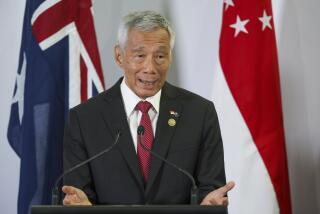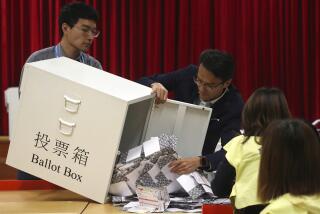‘Kinder, Gentler’ Singapore Less Popular With Voters? : Southeast Asia: The prime minister says it cost him four seats in Parliament. He says his policy will be reviewed.
- Share via
BANGKOK, Thailand — Prime Minister Goh Chok Tong, who has attempted to gradually relax Singapore’s authoritarian system of rule, said Sunday that he is reviewing his style of government after what he considered to be an embarrassing decline in the ruling party’s electoral popularity.
By most standards, the People’s Action Party scored a commanding victory by winning 77 of the 81 seats in the legislature in Saturday’s elections. But the party’s share of the vote fell to 61% from 63.2% in the last election in 1988.
Goh, who last November succeeded one of Asia’s elder statesmen, Lee Kuan Yew, as prime minister, had made his personal popularity the primary issue in the election. Lee, who remains a senior minister in Singapore’s government, had publicly warned that the party expected an improvement this year over the 1988 showing.
“I was the issue. I was contesting every seat,” Goh told a news conference Sunday.
Also painful for the ruling party was the victory of four opposition politicians, with the Singapore Democratic Party winning three seats and the Workers’ Party taking one seat.
The ruling party had controlled 80 of the 81 seats in Parliament before the election. Its control was so complete under Lee that it appointed a non-voting opposition to give the Parliament a semblance of debate.
Goh, 50, had tried to implement what he called a “kinder, gentler” government by relaxing Singapore’s strict censorship of films and by being more accessible to the public, attending question-and-answer sessions with the public--a departure from Lee’s aloofness.
“This style has cost me four seats this time,” Goh said. “Will it cost me another four seats in the future? So I’ve got to review my style.”
The ruling party has won commanding majorities in Parliament since the 1960s as the economy boomed and the country became one of Asia’s fastest growing manufacturing centers.
But there was also an undercurrent of restlessness that prompted a steadily increasing number of mainly young professionals to emigrate, primarily to Canada and the United States. In addition, the party’s majority declined in every election.
Some cited Lee’s authoritarian form of government, which they said was heavy-handed long after a perceived Communist threat had evaporated. Others were disillusioned by the emphasis on success, which they said turned the country into a permanent “rat race.”
The opposition also hit upon an unusual but successful strategy for contesting Saturday’s election. It did not enter candidates in 41 constituencies, meaning that the ruling party won the election by default even before election day.
Thus, when the voters went to the polls on Saturday, there was no concern that the government actually might lose the ballot. So, the theory goes, with the government safely in power, disgruntled voters felt freer to cast votes for the opposition.
While there has been some speculation that Lee wants eventually to be succeeded by his son, second Deputy Prime Minister Lee Hsien Loong, the younger Lee appeared at a news conference with Goh on Sunday to say that the party is behind the prime minister.
More to Read
Sign up for Essential California
The most important California stories and recommendations in your inbox every morning.
You may occasionally receive promotional content from the Los Angeles Times.









